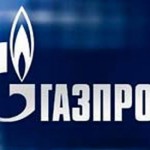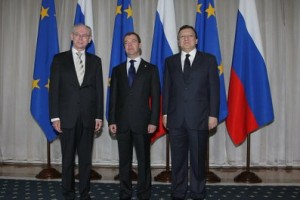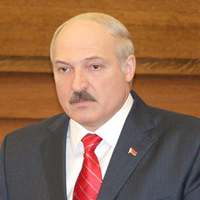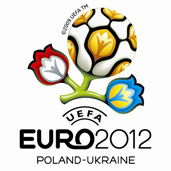Archive for June, 2011
 «У разных народов есть свои традиции глупости…в Германии выражение “подвиг шильдбюргеров” считается синонимом чрезмерного старания самодурной власти…идет поиск немецкими ведомствами источника кишечной эпидемии, которая унесла жизни уже 35 человек, в основном немцев… Сначала германские власти нашли вирусный штамм в испанских огурцах, потом выяснилось, что это не совсем тот штамм. Понятно, что испанцы обиделись. А немцы продолжили искать дальше, арестовали помидоры, которые потом также оказались ни при чем… инфекция якобы пошла на спад. Вот только люди и дальше умирают… Нелепая история. Ведь в немецких детективах полицай всегда побеждает…
«У разных народов есть свои традиции глупости…в Германии выражение “подвиг шильдбюргеров” считается синонимом чрезмерного старания самодурной власти…идет поиск немецкими ведомствами источника кишечной эпидемии, которая унесла жизни уже 35 человек, в основном немцев… Сначала германские власти нашли вирусный штамм в испанских огурцах, потом выяснилось, что это не совсем тот штамм. Понятно, что испанцы обиделись. А немцы продолжили искать дальше, арестовали помидоры, которые потом также оказались ни при чем… инфекция якобы пошла на спад. Вот только люди и дальше умирают… Нелепая история. Ведь в немецких детективах полицай всегда побеждает…
Но, слава Богу, не обошлось без подвига. Включилась Россия. Глава Роспотребнадзора Геннадий Онищенко запретил импорт европейских овощей, смело защищая свою страну и народ… Меры России являются необоснованными и непропорциональными”, — обиделся представитель Евросоюза в России Фернандо Валенсуэла. Ведь эпидемия практически полностью локализовалась в ФРГ… Не могли бы русские после внимательных проверок пустить к себе хотя бы греческие оливки или финскую петрушку? Не могли!… Говоря другими словами: Россия больше не хочет жрать западную дрянь, Россия окончательно поднялась с колен. Важность исторического момента была подчеркнута тем, что Владимир Путин лично ответил Фернандо Валенсуэле: “Мы не можем ради какого-то духа травить наших людей”…Ведь по большому счету Европе сейчас не до импортных запретов России. Евросоюзники нынче яростно обсуждают, сколько еще сотен миллиардов потребуют ненасытные греки на погашение своей финансовой катастрофы… Главсанврач России объяснил всему миру, почему немцы мрут как мухи: виноваты и “европейские нормативы… которые созданы в угоду экономике, а не охраны здоровья человека”, и низкий уровень немецких врачей да мизерное количество лекарств — “они не могут лечить, потому что тот антибиотик, который есть у них на вооружении, не убивает этот микроб, а только приносит вред”. (Немцы, кстати, практически не пользовались никакими антибиотиками, невероятно, как они все-таки вылечили 99 процентов больных.)…
Но Угрюм-Онищенко, очевидно, решил напомнить миру, что если у немцев есть Шильда и шильдбюргеры, то у русских — город Глупов со своими градоначальниками… Но когда прошлым летом жара и пожары в России переполняли трупами морги, европейские чиновники вслух не интересовались, куда в России делись деньги, предназначенные для приобретения противопожарной техники. А послали помощь…. Товарищ Онищенко почему-то не дал немецким больным ни одной таблетки. Даже не предложил… Те, правда, российской помощи и не очень-то ждут… врач Онищенко… как и большая часть полугосударственной российской общественности, действует по старой доброй традиции: не замечать собственного бардака, но защищать родину от страшных внешних угроз. Причем защищать так шумно, чтобы народ об этом бардаке позабыл…
Русские часто и охотно жалуются на западные двойные стандарты. Но российская политика по отношению к Западу сама ведется как бы на двух этажах… Когда надо, Москва принимает западных гостей на верхнем этаже, в суперсовременном интерьере, свободно болтая по-английски, убедительно требуя отмены виз в Европу. Приглашает западных инвесторов, выступает за “партнерство ради модернизации”, ездит с официальными визитами по приглашению баварского парламента, включая, конечно, посещение Октоберфеста…А когда надо, например перед выборами, та же Москва спускается обратно в старый совдеповский подвал, откуда на Запад можно смотреть только из бойниц. Там слова “наши партнеры” окрашиваются кислой иронией, вспоминается о западной корыстности, о западном предвзятом футбольном судействе и о том, что эти сволочи во время Великой Отечественной никак не хотели открывать второй фронт. И почему-то считается, что этот подвальный театр для домашней публики на Западе никто не замечает».
Статья – – Штефан Шолль – Московский Комсомолец № 25666 от 14 июня 2011 г. Stefan Scholl Moskovskij Komsomolets
 Sembrava la volta buona, ma anche all’ultimo vertice ufficiale al Cremlino l’accordo più importante è stato mancato. Russi e cinesi non sono riusciti a definire il prezzo di acquisto del gas che in futuro verrà venduto a Pechino. La costruzione di due condotte va avanti a marce forzate attraverso la Siberia, ma il dato principale non è stato ancora concordato.
Sembrava la volta buona, ma anche all’ultimo vertice ufficiale al Cremlino l’accordo più importante è stato mancato. Russi e cinesi non sono riusciti a definire il prezzo di acquisto del gas che in futuro verrà venduto a Pechino. La costruzione di due condotte va avanti a marce forzate attraverso la Siberia, ma il dato principale non è stato ancora concordato.
Le differenze tra le parti non sono piccole. I cinesi hanno ribadito che non sono disposti a pagare il metano a prezzi occidentali, ma i russi non sono disponibili ad alcun sconto. I primi pongono il tetto a 250 dollari per mille metri cubi, i secondi vorrebbero avvicinarsi ai 500, quotazione che per Mosca toccherà alla fine del 2011.
In passato, la Gazprom, la monopolista federale, aveva spiegato agli europei che, in caso di problemi con loro, avrebbe ridiretto il suo prezioso gas verso Pechino. I cinesi, però, hanno stretto contatti e contratti anche con il Turkmenistan, che ha le maggiori riserve di materia prima non utilizzata, proprio per evitare il rischio di avere un solo fornitore.
La questione del prezzo va avanti da anni senza soluzione di sorta. Il dubbio è che cosa succederebbe se russi e cinesi non dovessero trovare l’accordo. Mosca sta costruendo infrastrutture che all’improvviso non possono essere smontate o usate per altri fini.
The European Union and Russia are not only neighbours but also strategic partners. At the upcoming 27th summit, in Nizhny Novgorod, the EU will be represented by Herman Van Rompuy, President of the European Council and by José Manuel Barroso, President of the European Commission. Catherine Ashton, High Representative of the Union for Foreign Affairs and Security Policy, and Karel De Gucht, Commissioner for Trade, will also take part. Russia will be represented by Dmitry Medvedev, President of Russia. Foreign Minister Sergey Lavrov and Minister of Economic Development Nabiullina will also participate. The summit will take place over two days, beginning with an informal dinner on 9 June and continuing with a plenary session on the morning of 10 June, followed by a working lunch and a press conference. 
The parties are expected to discuss the following issues:
the global economy and global governance issues;
EU-Russia relations, in particular the EU-Russia Partnership for Modernisation;
international issues, including the developments in North Africa and the Middle East.
The Summit will on build on the good results achieved at last year’s EU Russia Summits, held in Rostov and Brussels.
The EU and Russia will take note of the good progress made in the implementation of the EURussia Partnership for Modernisation, which is a key initiative providing additional momentum to ongoing work in the Dialogues under our Common Spaces. The EU and Russia will discuss the state of play in the negotiations on Russia’s accession to the WTO, which are now at multilateral level. The new EU-Russia Agreement, which is currently being negotiated, should provide a solid basis for deepened bilateral relations in the 21st century covering all areas of EU-Russia relations.
A growing economic relationship
Economic ties between Russia and the EU have grown substantially over the last years. Russia remains the EU’s third most important trading partner in goods (after the US and China), with 87 billion EUR in exports to Russia (6.4% of all EU exports, 4th place after US, China, Switzerland) and 155 billion EUR in imports in 2010 (10.4 % of all EU imports, 3rd place after China and US, mostly natural resources). The EU is thus by far the largest market for Russian goods.
In 2010, both imports and exports rose by approximately 32 % compared to 2009, after having been hit by the global economic crisis. Russia enjoyed a trade surplus of 68 billion EUR with the EU. Russia’s total account surplus rose by 47% compared to 2009 and reached $ 79 billion in 2010. More specifically, Russia is the EU’s most important single supplier of energy products, accounting for over 25% of the EU consumption of oil and gas. In turn, Russia’s economy remains highly dependent on the export of energy raw materials, with the EU as its most 2 important destination. In 2010 63% of Russia’s exports consisted of crude oil, oil products and natural gas. The EU accounts for 88% of Russia’s total oil exports, 70% of its gas exports and 50% of its coal exports.
Financial cooperation
Financial cooperation with Russia began in the early 1990s, under the TACIS program, which has in the meantime been replaced by the European Neighbourhood and Partnership Instrument. To help smooth Russia’s transition, a whole range of sectors were supported. Since 1991, a total of around €2.8 billion of assistance was provided through the European Commission. A number of TACIS projects are still being implemented until 2013. Given the significant recent improvements in the Russian Federation’s fiscal position, the need for large volumes of financial assistance has declined. In fact, Russia herself has become a donor. Financial cooperation is now specifically targeted to meet the objectives defined in the road-maps to the EU-Russia Common Spaces. Cooperation is now carried out on the principle of co-financing by the EU and Russia. Most notably, Russia is co-financing Cross Border Cooperation programmes. Emphasis is on higher education cooperation, with Erasmus Mundus and Tempus supporting mobility of students and teaching staff.
Furthermore, funding for Russia also came from the Nuclear Safety Instrument (€500 million since 1991) and a number of other thematic programs. The European Democracy and Human Rights Instrument (EIDHR) financed 14 human rights projects in Russia in 2010 for nearly € 2 million, and the Institution Building Partnership Programme supported 16 projects with NGOs for a total of € 5 million.
EU-Russia relations – background
The legal basis for EU relations with Russia is the Partnership and Cooperation Agreement (PCA) which came into force on 1 December 1997 for an initial duration of 10 years, and which has been automatically extended beyond 2007 on an annual basis. It sets the principal common objectives, establishes the institutional framework for bilateral contacts, and calls for activities and dialogue in a number of areas. The EU is currently working with Russia on a new agreement to replace the PCA. Both the EU and Russia have experienced many political, economic and social changes since the entry into force of the PCA in 1997. The new agreement must reflect these changes as well as the new challenges linked to the globalised world in which we are living. At the St. Petersburg Summit in May 2003, the EU and Russia agreed to reinforce their cooperation by creating four “common spaces”:
the Common Economic Space aiming to make the EU and Russia’s economies more compatible to help boost investment and trade;
the Common Space on Freedom, Security and Justice covering the area also known as Justice and Home Affairs;
the Common Space on External Security aiming to enhance cooperation on foreign policy and security issues; and
the Common Space on Research, Education and Culture aiming to promote scientific, educational and cultural cooperation.
Materials from the site of the European Delegation to Russia.
 «Если бы мы не жили в глобализированном мире в эпоху Интернета, электронных паспортов и мобильных телефонов, этому еще было бы какое-то оправдание…. Виза — это рудиментарное средство, созданное, чтобы контролировать передвижения людей и не пускать криминальных лиц, как будто мафиозные элементы обращаются в консульства в надежде получить разрешения на свои спецтуры. Тот же самый разговор шпионов…
«Если бы мы не жили в глобализированном мире в эпоху Интернета, электронных паспортов и мобильных телефонов, этому еще было бы какое-то оправдание…. Виза — это рудиментарное средство, созданное, чтобы контролировать передвижения людей и не пускать криминальных лиц, как будто мафиозные элементы обращаются в консульства в надежде получить разрешения на свои спецтуры. Тот же самый разговор шпионов…
Несмотря на то что после распада СССР самое популярное слово в России стало “почём”, никто себе всерьез не задавал вопроса, сколько стоит содержать эту средневековую систему виз и какой непосредственный ущерб она провоцирует… Вряд ли в России стоимость этой машины окупается… У европейцев есть преимущество: они разделяют общие расходы среди всех членов Шенгенского соглашения, то есть среди 25 стран….
Туристические страны, такие как Италия и Испания, выступают за отмену виз с Россией…
Интересно посмотреть на то, как другие страны решили проблемы, связанные с визами в ЕС. Украина является здесь хорошим примером. С 1 мая 2005 года для граждан Европейского союза, США, Японии, Канады и ряда других государств не нужна виза для посещения страны на срок до 90 дней. Решение было принято Киевом в одностороннем порядке. Ответные шаги Евросоюза пока заставляют себя ждать, но все надеются на сюрприз во время проведения чемпионата Европы по футболу 2012 года… В течение этих лет безвизового режима миллионы европейских туристов открыли для себя Украину, влюбились в красоту Киева, Львова, Одессы…
В преддверии Олимпиады в Сочи в 2014 году Россия пока наблюдает за шагами соседа, но скоро и ей придется принимать какие-то решения, как во время финала Лиги чемпионов 2008 года в Москве. Иначе вырастет риск фиаско, связанный с малым количеством иностранных зрителей в Сочи-2014…
Как известно, в Европе есть страны, которые выступают за отмену виз, но есть и другие, в которых русофобия — еще достаточно распространенное чувство. Каждое шенгенское государство должно дать свое согласие на то, чтобы изменить общие правила. После начала “арабских весен”, в январе, ЕС получил подтверждение тому, что миграционная волна с юга, из Африки, теперь опаснее, чем с востока, из бывшего соцлагеря. Отношения между Францией и Италией перенесли тяжелые испытания из-за десятка тысяч тунисских нелегалов. Некоторые члены Шенгенского соглашения снова начали контролировать свои границы… Ожидать в ближайшее время существенных изменений в этой средневековой системе контроля народов, увы, не стоит…
Конечно, вопрос виз имеет не только нерешенные технические проблемы, но и политические черты. Европа тщательно наблюдает за развитием российской демократии, которой в этом году исполняется уже 20 лет…
Учитывая приближение сочинской Олимпиады и чемпионата мира по футболу в России, время сейчас играет не на пользу вашей стране, которая никак не хочет поставить себя в то положение, когда самые дружественные ей европейские партнеры могли бы оказать свою помощь».
Статья Джузеппе Д’Амато Московский Комсомолец № 25661 от 7 июня 2011 г. Giuseppe D’Amato Moskovskij Komsomolets.
 «Уже в июне в казну Батьки может поступить первый транш кредита из антикризисного фонда ЕврАзЭС — 800 миллионов долларов.
«Уже в июне в казну Батьки может поступить первый транш кредита из антикризисного фонда ЕврАзЭС — 800 миллионов долларов.
Чтобы реанимировать почти почившее в бозе белорусское экономическое чудо, таких денег явно недостаточно….
Новый кредит знаменует собой начало еще одного раунда странной игры, в которую уже не первый год играют Москва и Минск….Обязанности команды “Минск”: выбить из команды “Москва” как можно больше денег и при этом не дать ей приватизировать ни одного привлекательного белорусского экономического актива. Обязанности команды “Москва”: прорвать наконец оборону команды “Минск” и получить за свои деньги хоть что-то осязаемое….
Мне почему-то кажется: если кто-то в нашем руководстве и пребывает в состоянии эйфории, то его ждет разочарование….Лукашенко не переделаешь. Он снова попытается найти способ, выполняя договоренности по форме, не выполнять их по факту…
Если Батька начнет вести себя “не очень корректно”, против него снова применят шоковую терапию. Но это уже следующий раунд большой российско-белорусской игры. Игры, которая всем надоела, но которая все продолжается и продолжается».
Статья Михаил Ростовский Московский Комсомолец № 25661 от 7 июня 2011 г. Mikhail Rostovsky Moskovskij Komsomolets
 “Around two out of three Poles think preparations for the Euro 2012 football championships are not going well and three out of four are pessimistic about the national team’s chances at the finals, finds a new poll.
“Around two out of three Poles think preparations for the Euro 2012 football championships are not going well and three out of four are pessimistic about the national team’s chances at the finals, finds a new poll.
The survey by Homo Homini, commissioned by Polish Radio found that 60 percent of respondents think that construction work in Warsaw, Gdansk and other cities hosting the event are proceeding poorly, with 22 percent thinking preparations are going well, while 18 percent have no opinion on the issue.
As regards preparations by the national team, led by coach Franciszek Smuda, 75 percent of Poles are not expecting success at the finals.
The poll was taken, however, before Poland’s 2-1 win over Argentina in Warsaw on Sunday, with goals from Adrian Mierzejewski and Pawel Brozek for the home side and Marco Ruben for the visitors.
Though a good result for Poland, Argentina put out a second-string 11 without stars such as Lionel Messi, Javier Mascherano, Javier Pastore, Carlos Tevez and Gonzalo Higuain.
Poland’s final game of the season comes against France on Thursday, which was meant to take place at the PGE Gdansk stadium in the north – but due to incomplete preparations it has had to be moved to Legia Warszawa’s venue in the capital.
Government optimistic
Sports Minister Adam Giersz, however, has said he is confident that everything will be ready for the finals next summer.
“The venues will be up and running well ahead of the first whistle,” he told Polish Radio. “Construction should be ready a year before the event although there may be slight delays with the National Stadium in Warsaw and maybe with the one in Wroclaw [western Poland],” the sports minister added. He argued that many previous host countries reported delays in their preparations and yet the tournaments took place as scheduled.“The construction of the stadium in South Africa was completed only a month before the [2010] World Cup,” said Giersz.
Marcin Herra, head of PL2012, the company supervising the preparation process, says that 70 of the construction work is being carried out according to the schedule. The remaining 30 percent has caused some delays to road and railway construction, including the renovation of the central train stations in Warsaw and Poznan”.
Source – Polskie Radio.
Welcome
We are a group of long experienced European journalists and intellectuals interested in international politics and culture. We would like to exchange our opinion on new Europe and Russia.
Categories
- Breaking News (11)
- CIS (129)
- Climate (2)
- Energy&Economy (115)
- EU Eastern Dimension (85)
- Euro 2012 – Sochi 2014 – World Cup 2018, Sport (43)
- Euro-Integration (135)
- History Culture (198)
- International Policy (261)
- Military (74)
- Interviews (18)
- Italy – Italia – Suisse (47)
- Odd Enough (10)
- Poland and Baltic States (126)
- Religion (31)
- Russia (421)
- Survey (4)
- Turning points (4)
- Ukraine (176)
- Российские страницы (113)
Archives
- November 2020
- October 2020
- September 2020
- August 2020
- July 2020
- May 2020
- April 2020
- March 2020
- January 2020
- December 2019
- November 2019
- October 2019
- September 2019
- August 2019
- July 2019
- June 2019
- May 2019
- April 2019
- March 2019
- February 2019
- December 2018
- November 2018
- October 2018
- September 2018
- August 2018
- July 2018
- June 2018
- May 2018
- April 2018
- March 2018
- February 2018
- January 2018
- December 2017
- November 2017
- October 2017
- September 2017
- August 2017
- July 2017
- May 2017
- March 2017
- January 2017
- December 2016
- November 2016
- October 2016
- September 2016
- July 2016
- June 2016
- May 2016
- April 2016
- February 2016
- January 2016
- November 2015
- October 2015
- September 2015
- June 2015
- April 2015
- March 2015
- February 2015
- January 2015
- December 2014
- November 2014
- October 2014
- September 2014
- August 2014
- July 2014
- June 2014
- May 2014
- April 2014
- March 2014
- February 2014
- January 2014
- December 2013
- November 2013
- October 2013
- September 2013
- August 2013
- July 2013
- June 2013
- May 2013
- April 2013
- March 2013
- February 2013
- January 2013
- December 2012
- November 2012
- October 2012
- September 2012
- August 2012
- July 2012
- June 2012
- May 2012
- April 2012
- March 2012
- February 2012
- January 2012
- December 2011
- November 2011
- October 2011
- September 2011
- August 2011
- July 2011
- June 2011
- May 2011
- April 2011
- March 2011
- February 2011
- January 2011
- December 2010
- November 2010
- October 2010
- September 2010
- August 2010
- July 2010
- June 2010
- May 2010
- April 2010
- March 2010
- February 2010
- January 2010
- December 2009
- November 2009
- October 2009
- September 2009
- August 2009
Our books




